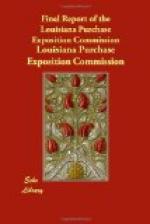With Rome the exact opposite occurred. The imperial city rose to absolute dominion over all the people of Italy, and then expanded her rule over the entire civilized world, by a process which kept the nation strong and united, but gave no room whatever for local liberty and self-government. All other cities and countries were subject to Rome. In consequence, this great and masterful race of warriors, rulers, road builders, and administrators stamped their indelible impress upon all the after life of our race, and yet let an over-centralization eat out the vitals of their empire until it became an empty shell, so that when the barbarians came they destroyed only what had already become worthless to the world.
The underlying viciousness of each type of expansion was plain enough, and the remedy now seems simple enough. But when the fathers of the Republic first formulated the Constitution under which we live, this remedy was untried, and no one could foretell how it would work. They themselves began the experiment almost immediately by adding new States to the original thirteen. Excellent people in the East viewed this initial expansion of the country with great alarm. Exactly as during the colonial period many good people in the mother country thought it highly important that settlers should be kept out of the Ohio Valley in the interest of the fur companies, so after we had become a nation many good people on the Atlantic coast felt grave apprehension lest they might somehow be hurt by the westward growth of the nation.
These good people shook their heads over the formation of States in the fertile Ohio Valley, which now forms part of the heart of our nation, and they declared that the destruction of the Republic had been accomplished when through the Louisiana Purchase we acquired nearly half of what is now that same Republic’s present territory. Nor was their feeling unnatural. Only the adventurous and the farseeing can be expected heartily to welcome the process of expansion, for a nation which expands is a nation which is entering upon a great career, and with greatness there must of necessity come perils which daunt all save the most stout-hearted.
We expand by carving the wilderness into Territories, and out of these Territories building new States when once they had received as permanent settlers a sufficient number of our own people. Being a practical nation, we have never tried to force on any section of our new territory an unsuitable form of government merely because it was suitable for another section under different conditions. Of the territory covered by the Louisiana Purchase, a portion was given statehood within a few years. Another portion has not been admitted to statehood, although a century has elapsed, although doubtless it soon will be. In each case we showed the practical governmental genius of our race by devising methods suitable




